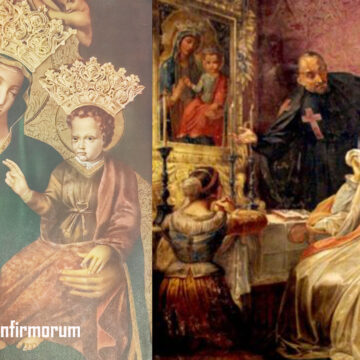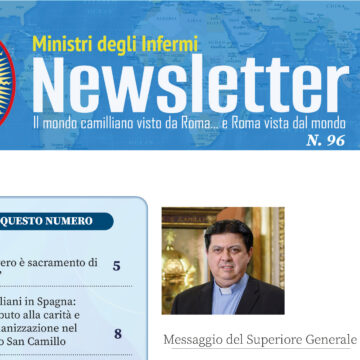Saturday, 16 May 2015
 The question was asked by Iwona Langa, a woman consecrated to the ‘Ordo virginum’ [Order of Virgins], from the Ain Karim family home: “Marriage and Christian virginity are two ways of fulfilling the vocation of love. Fidelity, perseverance, unity of heart, are commitments and challenges both for Christian spouses and for us, consecrated people: how can we illuminate each other’s path, for one another, and journey together toward the Kingdom?”
The question was asked by Iwona Langa, a woman consecrated to the ‘Ordo virginum’ [Order of Virgins], from the Ain Karim family home: “Marriage and Christian virginity are two ways of fulfilling the vocation of love. Fidelity, perseverance, unity of heart, are commitments and challenges both for Christian spouses and for us, consecrated people: how can we illuminate each other’s path, for one another, and journey together toward the Kingdom?”
As the first nun, Sr Fulvia Sieni, was — let’s say — “in prison”, this other sister is … “on the street”. Both carry the Word of God to the city. She asked a good question: “Is marital love and love in consecrated life the same love?”. Does it have those qualities of perseverance, fidelity, unity of heart? Are there commitments and challenges? This is why consecrated women say they are brides of the Lord. They marry the Lord. I had an uncle whose daughter became a nun and he said: “Now I’m the Lord’s father-in-law! My daughter is married to the Lord”. There is a spousal dimension to women’s consecration. In men’s consecration as well: it is said that the bishop is the “bridegroom of the Church”, because he stands in the place of Jesus, the bridegroom of the Church. But this female dimension — I will go somewhat outside of the question, in order to get back to it — of women is very important. Nuns are the icon of the Church and of Our Lady. Do not forget that the Church is female: it is not he the Church, but she the Church. And for this reason the Church is the bride of Jesus. So often we forget this; and we forget this maternal love of the nun, because the love of the Church is maternal; this maternal love of a nun, because the love of Our Lady is maternal. Fidelity, the expression of love of a consecrated woman, must mirror — not out of duty but connaturally — the fidelity, the love, the tenderness of Mother Church and the Mother Mary. A woman who does not enter this path, by consecrating herself, errs in the end. The maternity of a consecrated woman! Think a lot about this. As Mary is maternal and as the Church is maternal.
And you asked: how to illuminate each other’s path, for one another, and journey toward the Kingdom? Mary’s love and the love of the Church is a concrete love! Concreteness is the quality of this maternity of women, of nuns. Concrete love. When a nun begins to have ideas, too many ideas, too many ideas…. What did St Thérèse do? What advice did St Thérèse, the great one, give to her superior? “Give her a steak and then we’ll talk”. To bring her back down to reality. Concreteness. The concreteness of love is very difficult. It’s very difficult! And more so when one lives in community, because we all know the problems of communities: jealousy, gossip, that this superior is this, that the other is that…. These are concrete things, but not good! The concreteness of goodness, of love, which forgives all! If one must tell a truth, say it to the person’s face, but with love; pray before reprimanding and then ask the Lord that He go forth with the correction. It is concrete love! A nun cannot afford love in the clouds; no, love is concrete.
 What is the concreteness of a consecrated woman. What is it like? You can find it in two passages of the Gospel. In the Beatitudes: they tell you what you have to do. Jesus, the plan of Jesus, is concrete. So often I think that the Beatitudes are the first Encyclical of the Church. It’s true, because the entire plan is there. And then concreteness is found in the protocol by which we will all be judged: Matthew 25. The concreteness of the consecrated woman is there. With these two passages you can live the entire consecrated life; with these two rules, with these two concrete things, by doing these concrete things. By doing these concrete things you can also reach a level, a height of holiness and truly great prayer. But it takes concreteness: love is concrete! And your love as women is a concrete maternal love. A mother never speaks ill of her children. But if you are a nun, in a convent or lay community, you have this maternal consecration and it is not permissible to speak ill of other sisters! No. Always excuse them, always! That passage of the autobiography of St Thérèse of the Child Jesus is beautiful, when she found that nun who hated her. What did she do? She smiled and went on. A smile of love. And what did she do when she had to accompany that sister who was always glum, because she limped with both legs and the poor thing was sick: what did she do? She did her best! She led her well and then even cut her bread for her, she did something more for her. But she never criticized her from behind! That destroys maternity. A mother who criticizes, who speaks ill of her children is not a mother! I believe you say “stepmother” in Italian…. She isn’t a mother. I’ll tell you this: love — and you see that marital love, too, is the same figure, the figure of the maternity of the Church — is concreteness. Concreteness. I recommend you do this exercise: read the Beatitudes often, and read Matthew 25 often, the Judgement protocol. This does much good for the concreteness of the Gospel. I don’t know, are we finished here?
What is the concreteness of a consecrated woman. What is it like? You can find it in two passages of the Gospel. In the Beatitudes: they tell you what you have to do. Jesus, the plan of Jesus, is concrete. So often I think that the Beatitudes are the first Encyclical of the Church. It’s true, because the entire plan is there. And then concreteness is found in the protocol by which we will all be judged: Matthew 25. The concreteness of the consecrated woman is there. With these two passages you can live the entire consecrated life; with these two rules, with these two concrete things, by doing these concrete things. By doing these concrete things you can also reach a level, a height of holiness and truly great prayer. But it takes concreteness: love is concrete! And your love as women is a concrete maternal love. A mother never speaks ill of her children. But if you are a nun, in a convent or lay community, you have this maternal consecration and it is not permissible to speak ill of other sisters! No. Always excuse them, always! That passage of the autobiography of St Thérèse of the Child Jesus is beautiful, when she found that nun who hated her. What did she do? She smiled and went on. A smile of love. And what did she do when she had to accompany that sister who was always glum, because she limped with both legs and the poor thing was sick: what did she do? She did her best! She led her well and then even cut her bread for her, she did something more for her. But she never criticized her from behind! That destroys maternity. A mother who criticizes, who speaks ill of her children is not a mother! I believe you say “stepmother” in Italian…. She isn’t a mother. I’ll tell you this: love — and you see that marital love, too, is the same figure, the figure of the maternity of the Church — is concreteness. Concreteness. I recommend you do this exercise: read the Beatitudes often, and read Matthew 25 often, the Judgement protocol. This does much good for the concreteness of the Gospel. I don’t know, are we finished here?














Camillians on Facebook
Camillians on Twitter
Camillians on Instagram